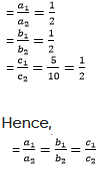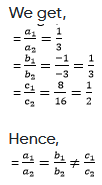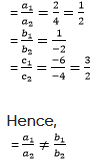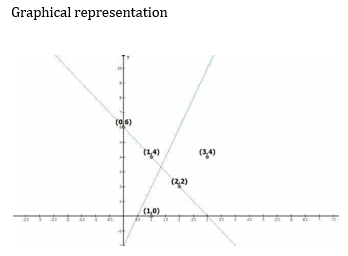Share
(i) x + y = 5, 2x + 2y = 10
(ii) x – y = 8, 3x − 3y = 16
(iii) 2x + y = 6, 4x − 2y = 4
(iv) 2x − 2y – 2 = 0, 4x − 4y – 5 = 0
ReportQuestion
i) x + y = 5
2x + 2y = 10
We get,

Therefore these pair of lines have infinite number of solutions and
x + y = 5
x = 5 - y
putting y = 1,2,3 we get,
x = 5 -1 = 4
x = 5 - 2 = 3
x = 5 - 3 = 2
| x | 4 | 3 | 2 |
| y | 1 | 2 | 3 |

| x | 4 | 3 | 2 |
| y | 1 | 2 | 3 |
(ii) x – y = 8, 3x − 3y = 16

Therefore, these linear equations are intersecting each other at one point and thus have only one possible solution.
Hence,the pair of linear equations is inconsistent.
(iii) 2x + y = 6, 4x − 2y = 4
We get,

Therefore, these linear equations are intersecting each other at one point and thus have only one possible solution.
Hence,the pair of linear equations is consistent
2x + y - 6 = 0
y = 6 - 2x
| x | 0 | 1 | 2 |
| y | 6 | 4 | 2 |

| x | 1 | 2 | 3 |
| y | 0 | 2 | 4 |

(iv) 2x − 2y – 2 = 0, 4x − 4y – 5 = 0
We get,

Therefore, these linear equations are parallel to each other and have no possible solution,
Hence,the pair of linear equations is inconsistent.
solved
5
wordpress
4 mins ago
5 Answer
70 views
+22

Leave a reply